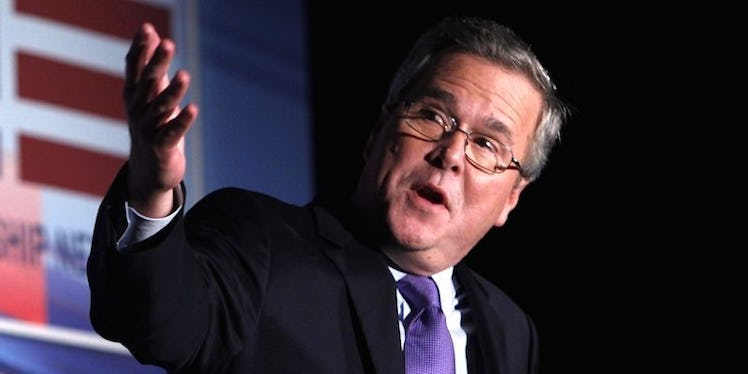
What's In A Name? Jeb Bush's Greatest Obstacle To Presidency
During a speech on Wednesday, Jeb Bush said,
“I love my brother; I love my dad; I actually love my mother, too. I admire their service to the nation and the difficult decisions they had to make. But I am my own man. My views are shaped by my own thinking and own experiences.”
Voters can accept the love shared between brothers, or father and son.
However, for any candidate, it can be difficult to escape the shadow of a former president of the same party. When those presidents are family, the shadow could be inescapable and doom the candidate to failure.
This is the difficult path Jeb Bush (son of President George H. W. Bush and brother of President George W. Bush, if you haven’t already gotten that) is currently navigating.
Though he has not made a run for the White House official, every sign seems to indicate he plans to.
Unlike any other potential 2016 candidate besides Hillary Clinton, Jeb Bush has almost as much going for him as he has going against him.
The elephant in the room is clearly his brother’s legacy, which still weighs heavily on the political landscape of the country.
Having such an intimate connection to a man who oversaw the largest recession since the Great Depression and two long, unpopular wars will weigh heavily in the minds of voters.
Primary election voters might not be as affected by this connection as independents or moderates who vote in the general election.
A recent CNN/ORC poll shows that 64 percent of voters believe Bush represents the “past” more than any other potential GOP candidate.
On the flip side, only Clinton and Senator Elizabeth Warren are thought to represent more of the “future” than the “past.”
Bush has been doing well in other polls, though, admittedly, these early polls seem to change weekly (if not daily), depending largely on what sort of media attention one candidate receives at any given time.
Jeb Bush got into the family business years ago and served as Governor of Florida, which means he is no newcomer to electoral politics.
His record as governor has both good and bad elements.
However, he has not run for office since 2002 and has been out of the governor’s mansion since 2007.
This was before the recession, and it is arguable to say the US has changed dramatically since the last time he’s been in a position of power.
Having executive experience in the important swing state of Florida is a plus, as is his ability to paint himself as an “outsider,” since it’s been eight years since he’s held office.
However, his last name will surely be his largest hurdle to clear at this point.
Bush has been running what could be considered a covert campaign for over a year now, slowly laying the ground work and watching the steps he takes.
He has hired a small staff of former advisors to help guide him along this process.
He's also been racking up IOU’s with other candidates and state parties by attending over 50 events and helping to raise millions of dollars.
Events with fellow Republicans have also reconnected him to party activists and donors. With these connections, and those of his family’s, Bush has conducted something akin to lightning warfare with donors.
After establishing two political action committees (PACs), both called “Right to Rise,” he has had tremendous success fundraising.
With at least six $100,000/person fundraisers planned, some suspect he is on track to raise $50 to $100 million in the first quarter of this year. George Bush implemented a similar tactic in 2000, which helped him secure the nomination.
If Jeb enters the race with such a considerable war chest, it could scare away other formidable opponents for the nomination.
No political operative today would neglect the importance of money; however, a solid campaign infrastructure and popular positions are going to also be necessary to win.
Bush has a large pool of potential staff to choose from, individuals who have helped him, his brother and father get elected.
He also has personal connections to foreign and domestic policy experts that other potential candidates might not have at this point.
(Not to mention, he has the best mentors a presidential candidate could ask for: two former presidents.)
Experts might not be as necessary for this Bush, however.
He is known to be a bit of a policy wonk who has staked himself on more moderate positions than the conservative bent of the Republican Party.
This is particularly true on immigration policy, where he has upset some of the party establishment with his more moderate views on how to solve the problem.
He is also fluent in Spanish and governed a state with a high Hispanic population.
This is important because he and the Republicans need to woo Hispanics and other demographics if they hope to win the White House in the years ahead.
Given all these factors, Jeb Bush could prove to be the most formidable candidate for the GOP nomination in 2016.
His ability to fundraise, his flub-free media presence and his moderate establishment positions might be able to supersede the battle he will endure with his last name.